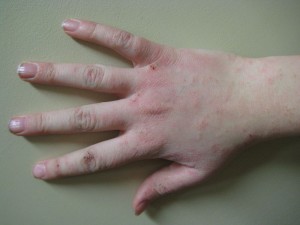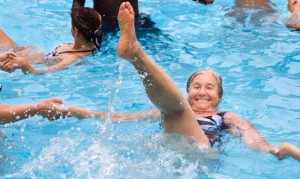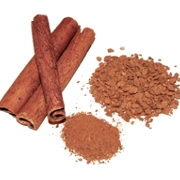 For decades, health advocates have touted the benefits of vitamins. And it’s a concept that our busy society can easily get behind: Just take a few tablets each day to ward off disease and improve your health. [Read more…]
For decades, health advocates have touted the benefits of vitamins. And it’s a concept that our busy society can easily get behind: Just take a few tablets each day to ward off disease and improve your health. [Read more…]
An update: New evidence on vitamins
Alternative treatments for eczema don’t work
 Researchers estimate more than 31 million Americans suffer from eczema, an itchy skin rash that often includes redness, swelling and cracking of the skin. The most common treatments are moisturizers and steroid creams, but they are not always effective at controlling the symptoms. [Read more…]
Researchers estimate more than 31 million Americans suffer from eczema, an itchy skin rash that often includes redness, swelling and cracking of the skin. The most common treatments are moisturizers and steroid creams, but they are not always effective at controlling the symptoms. [Read more…]
The evidence on kangaroo care
 An estimated 18 million babies worldwide are born each year with low birthweight – the vast majority of them in developing countries where comprehensive neonatal care is not available. So what’s the best way to care for them? [Read more…]
An estimated 18 million babies worldwide are born each year with low birthweight – the vast majority of them in developing countries where comprehensive neonatal care is not available. So what’s the best way to care for them? [Read more…]
What we know about treating nausea during pregnancy
 Feeling nauseous while pregnant can have a debilitating effect on your life – making it difficult to concentrate at work, care for other children and even perform ordinary tasks like taking out the garbage. [Read more…]
Feeling nauseous while pregnant can have a debilitating effect on your life – making it difficult to concentrate at work, care for other children and even perform ordinary tasks like taking out the garbage. [Read more…]
Meditation: powerful medicine for depression
 Approximately one in ten Americans suffer from depression, according to the U.S. Centers for Disease Control and more than 40 million Americans have been diagnosed with an anxiety disorder. There is new evidence released last week that offers an alternative treatment for these patients. A meta analysis published last week in the Journal of American Medical Association found that meditating for 30 to 40 minutes was effective in reducing the symptoms of depression, anxiety, and chronic pain.
Approximately one in ten Americans suffer from depression, according to the U.S. Centers for Disease Control and more than 40 million Americans have been diagnosed with an anxiety disorder. There is new evidence released last week that offers an alternative treatment for these patients. A meta analysis published last week in the Journal of American Medical Association found that meditating for 30 to 40 minutes was effective in reducing the symptoms of depression, anxiety, and chronic pain.
Can eating garlic lower your blood pressure?
 My grandmother, a health food fanatic long before it was popular, frequently munched on raw garlic “for medicinal purposes.” So I wasn’t surprised to see the results of a recent systematic review on the potential virtues of eating garlic to lower blood pressure. My grandmother’s seemingly quirky behavior may prove to be healthy ones after all. High blood pressure is clearly something to avoid given its link to heart disease and stroke. And it affects a lot of people: according to the American Heart Association, one out of every three adults has high blood pressure. Could garlic be the answer?
My grandmother, a health food fanatic long before it was popular, frequently munched on raw garlic “for medicinal purposes.” So I wasn’t surprised to see the results of a recent systematic review on the potential virtues of eating garlic to lower blood pressure. My grandmother’s seemingly quirky behavior may prove to be healthy ones after all. High blood pressure is clearly something to avoid given its link to heart disease and stroke. And it affects a lot of people: according to the American Heart Association, one out of every three adults has high blood pressure. Could garlic be the answer?
Cranberry juice for urinary tract infections?
Urinary tract infections are the second most common type of infection in U.S. adults, accounting for about 8.1 million visits to health care providers each year. It’s a long-standing adage that drinking cranberry juice can help, but what does the evidence say?
More evidence on exercise
 Last week, we discussed the evidence on using exercise to treat depression. This week, there is a new review on the benefits of exercise – this time to treat heart disease. [Read more…]
Last week, we discussed the evidence on using exercise to treat depression. This week, there is a new review on the benefits of exercise – this time to treat heart disease. [Read more…]
Does exercise help alleviate depression?
 If I come home in a bad mood, my husband usually suggests I head out for a run or over to the pool for a swim. That’s because he knows that exercise helps to improve my frame of mind. But does it also help improve the symptoms for people suffering from clinical depression? [Read more…]
If I come home in a bad mood, my husband usually suggests I head out for a run or over to the pool for a swim. That’s because he knows that exercise helps to improve my frame of mind. But does it also help improve the symptoms for people suffering from clinical depression? [Read more…]
Cinnamon to treat diabetes?
The evidence on music therapy
Exercise: One of the best medicines for your heart
We all know that exercise is good for us. But a new systematic review shows that regular exercise can significantly reduce cardiovascular risk factors, which ultimately reduces the risks of dying from heart disease.
The review spells out detailed evidence about how much exercise is needed to improve cardiovascular health, and which populations benefit the most. Here are some of the take-home messages that I found most interesting:
- The more your exercise, the more you reduce your risk of heart disease. An individual who moves from moderate levels of exercise to high levels sees a corresponding reduction in risk.
- There is a strong relationship between low levels of physical activity and death from cardiovascular disease. In other words, if you don’t exercise at all, you’re more likely to die of heart disease.
- Even if you suffer from other risk factors, such as diabetes or obesity, exercising still reduces your risk of dying from heart disease.
- People who are thin and don’t exercise are at a higher risk for heart disease.
But how much exercise is needed to produce health benefits? It may be more than you think.
The authors suggest it requires aerobic exercise at a moderate intensity – where you can have a conversation, but you may need to pause in between phrases to catch your breath – for a minimum of 30 minutes, four to five times per week. In addition, they recommend resistance training, such as lifting weights, using 8 to 10 different exercises that target the whole body two to three times each week.
The National Center on Health, Physical Activity and Disability provides a wonderful summary of the full review in its February newsletter.
The bottom line: exercising improves cardiovascular fitness and reduces your risk of heart disease. One of the best things you can do for your heart is to get moving.




